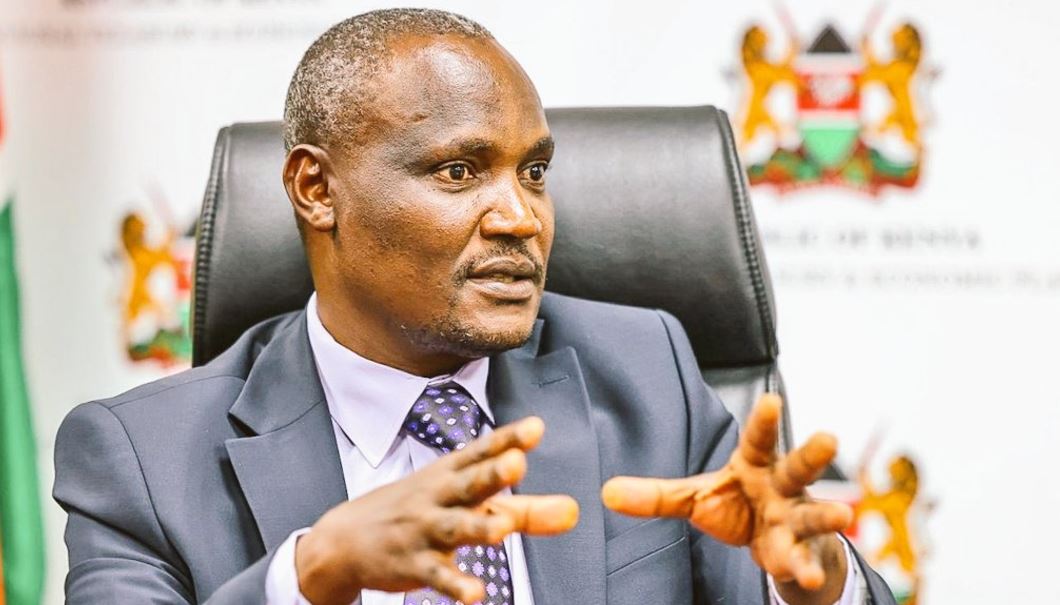CS Mbadi summoned over eCitizen revenue control, pension delays

MPs have raised concerns that the government lacks full control over eCitizen, relying on a private vendor for 18 critical functions. They argue that this exposes the system to revenue leakages, security breaches, and operational risks.
Lawmakers have launched a probe into financial discrepancies at the National Treasury, summoning Cabinet Secretary John Mbadi and Principal Secretary Chris Kiptoo to explain issues surrounding eCitizen revenue collection and pension delays.
The Departmental Committee on Finance and National Planning seeks answers on why the Treasury, which is responsible for overseeing revenue collection, transferred this function to the Immigration Department.
More To Read
- AG advises Treasury CS to halt Sh50 e-Citizen convenience fee following High Court order
- Treasury under fire for using Sh2.67 trillion in domestic loans on recurrent spending
- Blow to State as court declares eCitizen Sh50 charge illegal, halts mandatory school fee payment via platform
- National Treasury secures Sh437.8 billion loan to plug budget deficit
- MPs raise alarm over alleged misappropriation of College of Insurance land
- Ruto says fibre-optic growth powering faster eCitizen services and digital access
MPs have raised concerns that the government lacks full control over eCitizen, relying on a private vendor for 18 critical functions. They argue that this exposes the system to revenue leakages, security breaches, and operational risks.
Committee Chairperson Kuria Kimani issued the summons during a meeting with PS Kiptoo to discuss the Budget Policy Statement for the 2025/2026 financial year. He directed the two top officials to appear before the committee next week to clarify the circumstances under which the Treasury ceded its mandate to the State Department of Immigration and Citizen Services.
“The responsibility of collecting revenue is domiciled at the National Treasury. What criteria was used to have this role shifted to the State Department of Immigration and Citizen Services?” Kimani posed.
Accountant General Bernard Ndung’u, who was representing the Treasury, tried to explain that there was an existing agreement between the Treasury and the Immigration Department regarding the management of eCitizen revenue.
He assured MPs that despite Immigration’s involvement, the Treasury retained control over the funds collected through the platform.
However, MPs were dissatisfied with his response and demanded to know what safeguards had been put in place to prevent revenue loss, given that the Treasury was no longer solely managing the platform.
“Now that you are not in charge of the platform’s operations, how do you ensure that there is no pilferage of these funds?” Karachuonyo MP Okuome Adipo and Turkana South MP John Ariko posed.
Ndung’u reiterated that the Immigration Department was merely a facilitator to enhance service delivery, while the Treasury maintained financial oversight.
“This is a shared responsibility between the National Treasury and the Immigration Department, but the National Treasury has control of the funds collected,” he said.
The Finance Committee also directed CS Mbadi to outline punitive measures against accounting officers who had failed to remit statutory deductions, resulting in pension delays for retirees.
Kimani put Treasury officials on the spot over unpaid pension arrears amounting to Sh54 billion, citing records from the Retirement Benefits Authority (RBA).
In response, Treasury officials said there were plans to transition from the current manual pension payment system to an automated one by May 2025.
MPs insisted that the Treasury take legal action against all defaulting accounting officers to ensure compliance with statutory deductions.
The committee also questioned discrepancies in the 2025/2026 budget projections after it emerged that two different figures had been presented in the Budget Policy Statement.
“The Ministry has provided two different figures in the Budget Policy Statement tabled in the House last week. We need to know which figure is the correct one. Is it the Sh4.226 trillion or the other figure of Sh4.336 trillion?” Kimani posed.
Ndung’u assured the committee that the Treasury would issue an amendment to the Budget Policy Statement before parliamentary review.
Additionally, MPs raised concerns over a proposed 50 per cent reduction in National Government-Constituency Development Fund (NG-CDF) allocations, which would see the fund slashed from Sh70 billion to Sh31 billion in the 2025/2026 financial year.
Other issues discussed during the session included unrealistic revenue growth projections, persistent budget shortfalls, expenditure carryovers, inflation trends versus the high cost of living, rising interest rates, and the lack of transparency in the zero-based budgeting approach.
Top Stories Today















































